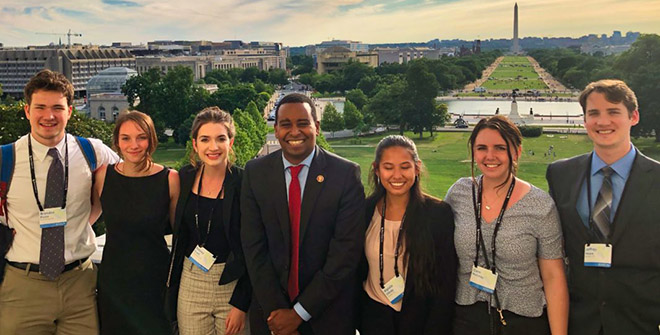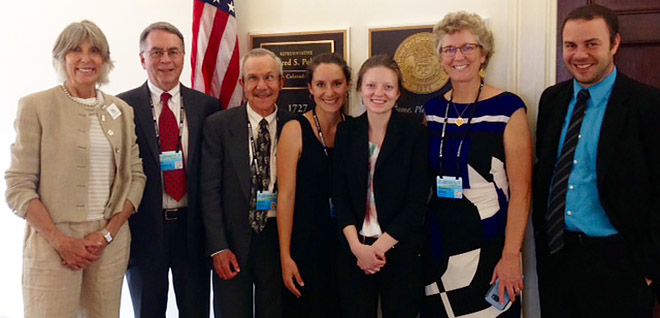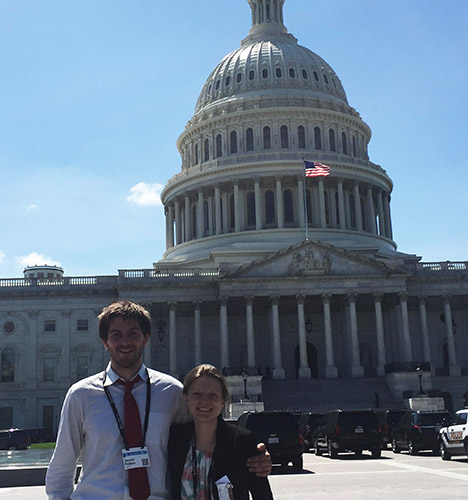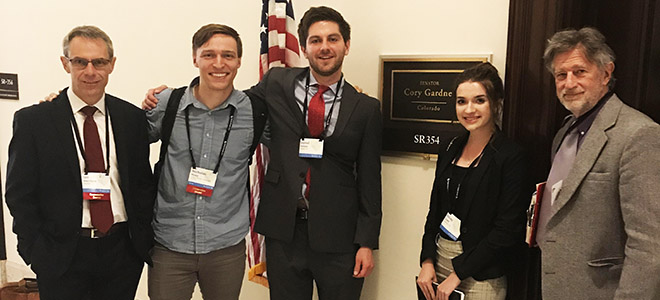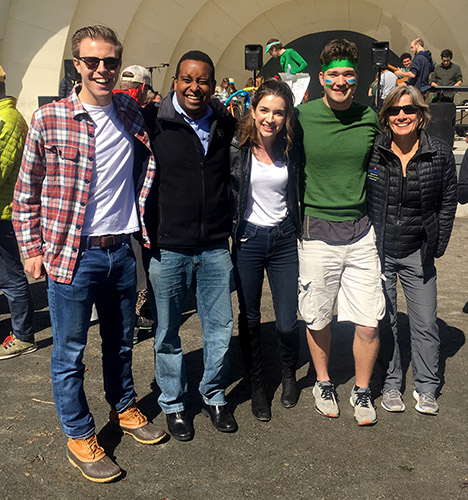The Non-Partisan Environmental Group That Will Make You Feel Hopeful About Climate Changeby Alison Gilchrist |
|
Citizens’ Climate Lobby members lobbying for Joe Neguse. |
|
If there’s anything that can make you feel hopeful about the future of climate change, it might be the Citizens’ Climate Lobby. Or, more precisely, the people who make up our local chapters of the Citizens’ Climate Lobby. The Citizens’ Climate Lobby (CCL) is a grassroots environmental group with chapters all over the world. The goal of the organization is to write and support legislation that influences climate policy in specific ways. Chapters also train volunteers to interact directly with their political systems to achieve this goal. Boulder has two chapters: Boulder CCL and a CU-specific chapter. This month, both groups are paying close attention to the international furor created, in part, by climate activist Greta Thunberg. An international climate strike (to be held between September 20th and 27th) is kicking off this Friday, and has already mobilized a much younger crowd than many other political events. Kelsey Grant is the leader of the CCL chapter at CU Boulder, and will be attending the strike. Her experience from past strikes galvanized her, and she’s excited to be participating again. “You finally realize you’re not alone,” said Grant. “You realize there are people who are equally committed to getting something done—it makes you feel hopeful.” |
|
Citizens’ Climate Lobby members lobbying for Jared Polis. |
|
Grant is especially supportive of the climate strikes as a way to get younger people involved in the political discussion. “If we didn’t have youth doing this, we wouldn’t be where we are today,” she said. “A strike conveys a certain message to your lawmakers: that you want something done.” Grant also attends the strike with some CCL-specific goals in mind: reaching across the political aisle between liberals and conservatives. CCL only supports legislation with bipartisan buy-in, despite many climate-focused groups and movements catering to left-leaning citizens. “While in theory the strikes are non-partisan, in practice they’re actually not. It just naturally attracts more left-leaning individuals,” says Grant. “But conservatives want a place in this discussion as well; they take it seriously. They increasingly feel disenfranchised from the larger Republican party.” Grant says that the strike can be an opportunity to build bridges. “For the people going to these strikes, this is a really good opportunity to reach their hands out to conservative peers and say: this is a place for you. We’re going to make a place for conservative solutions, and we want your discussion.” But the strike is not the only way that CCL members in Boulder are making themselves useful in the battle for effective climate change policy. Although supportive of the strike, Lindsay Sonderhouse, Boulder CCL chapter member, is missing it. |
|
“I do think strikes are important; they show that there’s an incredible amount of people who care about this problem,” said Sonderhouse. “But in terms of what I’ve seen be the most effective, I think that if I went, it would be the least effective that I did this year.” Sonderhouse is a physics graduate student at CU Boulder studying optical atomic clocks. She joined CCL to feel like she was making a palpable difference in the world. “I felt like I wasn’t doing enough outside of my own lab,” Sonderhouse said. “Climate change is one of the most important topics to me, and I do feel like our generation needs to solve it.” She recruited Daniel Palken, a fellow physics graduate student studying dark matter. Palken came into the CCL fold with similar motivations, and agrees that although the strikes are important, there are multiple places where people can have an impact on climate policy. “Right now, all of these parts of the climate movement don’t have enough people in them,” said Palken. “We could use more people striking, more people in the halls of congress. But one of those is even more effective—the halls of congress approach.” |
Citizens’ Climate Lobby members, Dan Palken and Lindsay Sonderhouse, in DC to lobby, in front of the Capitol building. |
This, said both Sonderhouse and Palken, is where young people can really make a difference. Sonderhouse spoke to the power of lobbying. “If you have a younger person there, then the member of congress seems to be really engaged,” she said. “They’re listening more, they’re usually impressed by somebody who’s young, who’s taking the initiative at such a young age to be involved in politics.” And younger people bring a valuable and powerful perspective to the table: the perspective of those who didn’t cause the problem but are trying to solve it anyway. “Younger people have a different moral standing in the argument,” said Palken. “Younger people did not create the problem of climate change. But very ironically, we’re the ones who are going to have to deal with it. I think that’s why you see that a) young people feel very empowered to act on it, and b) why people will listen.” |
|
Citizens’ Climate Lobby members lobbying for Cory Gardner. |
|
Palken thinks that although the younger generation has done an excellent job of driving attention to the issue, it’s currently the older generation who are left carrying the legislative torch. He urges Friday’s strikers to get involved beyond the walk-outs and try to engage with the political system. “I think if the younger generation would do for climate policy what it’s done for climate awareness, we would probably have this problem solved next week,” said Palken. “If you got all the young people off the streets, into their congressional offices, respectfully lobbying, in the mode that CCL has worked on developing for ten years now, with all the know-how we have in place, you would have a lot of progress very quickly.” The Citizens’ Climate Lobby could be just the group for those strikers and activists who want to make this change. Open to all, deliberately non-partisan, and committed to training volunteers, it feels like an oasis from the highly confrontational political debates that are happening at the moment. |
|
CCL is specifically trying to implement a carbon fee and dividend, a system that imposes a carbon tax on the sale of fossil fuels, and distributes the revenue equally as a regular payment to individuals. This system would reduce carbon emissions without being a disproportionate burden on lower-income populations. Interested in the specifics? Want to lend a hand to the cause regardless? The Boulder chapters of Citizens’ Climate Lobby want to meet you. As Kelsey Grant says, the time to get involved is now. “Young people want our governments to rise to the occasion, and to respond in a way that matches the urgency and magnitude of climate change,” said Grant. “I personally would love to see more people engaging within the political system because I think we can be extremely powerful there.” Plus, you know you want an “Ask Me About Carbon Fee & Dividend” t-shirt. |
Citizens’ Climate Lobby members attend a student-led climate strike on March 15 with Joe Neguse. |
 Alison Gilchrist Alison Gilchristalison.gilchrist@colorado.edu CSTPR Science Writing Intern |
|


